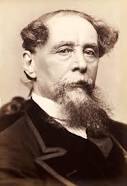Our School Page #3
"Our School" is a short, semi-autobiographical piece by Charles Dickens that reflects on his own experiences as a young boy at a boarding school. Through a blend of humor and critique, Dickens explores the harsh realities of educational institutions in the 19th century, highlighting the strict discipline, inadequate teaching methods, and the impact of such an environment on young minds. The narrative captures both the camaraderie among students and the frustrations they face, offering a poignant commentary on the education system of Dickens's time.
him, in the midst of a dread silence, and said, ‘Mr. Blinkins, are you ill, sir?’ how he blushingly replied, ‘Sir, rather so;’ how the Chief retorted with severity, ‘Mr. Blinkins, this is no place to be ill in’ (which was very, very true), and walked back solemn as the ghost in Hamlet, until, catching a wandering eye, he called that boy for inattention, and happily expressed his feelings towards the Latin master through the medium of a substitute. There was a fat little dancing-master who used to come in a gig, and taught the more advanced among us hornpipes (as an accomplishment in great social demand in after life); and there was a brisk little French master who used to come in the sunniest weather, with a handleless umbrella, and to whom the Chief was always polite, because (as we believed), if the Chief offended him, he would instantly address the Chief in French, and for ever confound him before the boys with his inability to understand or reply. There was besides, a serving man, whose name was Phil. Our retrospective glance presents Phil as a shipwrecked carpenter, cast away upon the desert island of a school, and carrying into practice an ingenious inkling of many trades. He mended whatever was broken, and made whatever was wanted. He was general glazier, among other things, and mended all the broken windows—at the prime cost (as was darkly rumoured among us) of ninepence, for every square charged three-and-six to parents. We had a high opinion of his mechanical genius, and generally held that the Chief ‘knew something bad of him,’ and on pain of divulgence enforced Phil to be his bondsman. We particularly remember that Phil had a sovereign contempt for learning: which engenders in us a respect for his sagacity, as it implies his accurate observation of the relative positions of the Chief and the ushers. He was an impenetrable man, who waited at table between whiles, and throughout ‘the half’ kept the boxes in severe custody. He was morose, even to the Chief, and never smiled, except at breaking-up, when, in acknowledgment of the toast, ‘Success to Phil! Hooray!’ he would slowly carve a grin out of his wooden face, where it would remain until we were all gone. Nevertheless, one time when we had the scarlet fever in the school, Phil nursed all the sick boys of his own accord, and was like a mother to them. There was another school not far off, and of course Our School could have nothing to say to that school. It is mostly the way with schools, whether of boys or men. Well! the railway has swallowed up ours, and the locomotives now run smoothly over its ashes. So fades and languishes, grows dim and dies, All that this world is proud of, - and is not proud of, too. It had little reason to be proud of Our School, and has done much better since in that way, and will do far better yet.
Translation
Translate and read this book in other languages:
Select another language:
- - Select -
- 简体中文 (Chinese - Simplified)
- 繁體中文 (Chinese - Traditional)
- Español (Spanish)
- Esperanto (Esperanto)
- 日本語 (Japanese)
- Português (Portuguese)
- Deutsch (German)
- العربية (Arabic)
- Français (French)
- Русский (Russian)
- ಕನ್ನಡ (Kannada)
- 한국어 (Korean)
- עברית (Hebrew)
- Gaeilge (Irish)
- Українська (Ukrainian)
- اردو (Urdu)
- Magyar (Hungarian)
- मानक हिन्दी (Hindi)
- Indonesia (Indonesian)
- Italiano (Italian)
- தமிழ் (Tamil)
- Türkçe (Turkish)
- తెలుగు (Telugu)
- ภาษาไทย (Thai)
- Tiếng Việt (Vietnamese)
- Čeština (Czech)
- Polski (Polish)
- Bahasa Indonesia (Indonesian)
- Românește (Romanian)
- Nederlands (Dutch)
- Ελληνικά (Greek)
- Latinum (Latin)
- Svenska (Swedish)
- Dansk (Danish)
- Suomi (Finnish)
- فارسی (Persian)
- ייִדיש (Yiddish)
- հայերեն (Armenian)
- Norsk (Norwegian)
- English (English)
Citation
Use the citation below to add this book to your bibliography:
Style:MLAChicagoAPA
"Our School Books." Literature.com. STANDS4 LLC, 2025. Web. 22 Feb. 2025. <https://www.literature.com/book/our_school_4456>.








Discuss this Our School book with the community:
Report Comment
We're doing our best to make sure our content is useful, accurate and safe.
If by any chance you spot an inappropriate comment while navigating through our website please use this form to let us know, and we'll take care of it shortly.
Attachment
You need to be logged in to favorite.
Log In